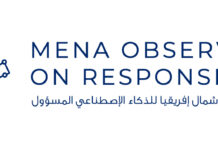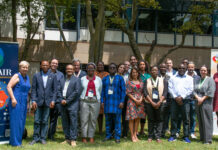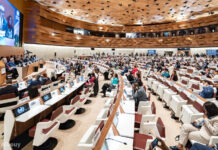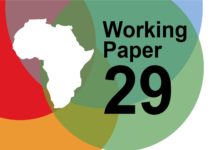By Nagham El Houssamy and Nadine Weheba
This is part one in a three part series. For part two, click here. Part three can be read here.
Monumental advances in technology are impacting human lives, including in Africa. Fourth industrial revolution (4IR) technologies, data, and artificial intelligence (AI) feature prominently in initiatives conducted at Open AIR hubs across Africa and in Canada. An array of activities, including research, teaching and outreach related to 4IR and AI are taking place at our different hubs. Each of these activities ties directly or indirectly, to Open AIR’s goal of creating explorative knowledge of the developmental implications of AI, specifically in Africa.
Through thematic research on high technology hubs, informal innovation, and indigenous entrepreneurship in Africa, Open AIR is taking steps toward advancing an emerging research agenda on AI for development. With this research, we are tackling questions related to AI and gender equality, AI’s future impacts on youth employment, and the inclusion of marginalized communities in African AI policies.
This series will give an overview and the highlights of our ongoing research into these topics on both the African continent and across the globe.
Open AIR Research into 4th Industrial Revolution Technologies and Artificial Intelligence: North Africa
In part one, we first turn to our Northern African hub, the Access to Knowledge for Development Center (A2K4D) at the American University in Cairo, Egypt.
A2K4D: Expanding Global Discussions
A2K4D’s research on knowledge, technology, data and development has expanded to include open data, AI and development in the Global South. A2K4D’s 4IR and AI activities to date include giving presentations, participating in workshops, writing blog posts, and producing publications. In November 2017, A2K4D’s Founding Director, Open AIR Co-Principal Investigator (PI), and Open AIR’s metrics Theme Leader, Nagla Rizk, and her former Senior Researcher, Stefanie Felsberger, participated in the AI & Inclusion Symposium, in Rio de Janeiro, Brazil. The summit was organized by the Global Network of Internet & Society Centers and hosted by the Institute for Technology and Society in Rio. Through A2K4D’s participation at the symposium, Rizk and Felsberger sought to introduce the concerns of countries like Egypt to the global debates around AI and inclusion.
In response the first keynote address, “Coming to Common Understandings of AI & Inclusion,” Rizk spoke about how AI can be used for positive goals, with a particular focus on localized knowledge creation for development in the Global South. On day two of the summit, Felsberger participated as a panelist in a deep dive on “Data and Economic Inclusion,” where she talked about ways to rethink the power imbalances between technology users and producers. Links to the talks can be found here:
AI for Development
Following participating in the AI & Inclusion Symposium in 2017, Rizk participated in the AI for Good Summit, held at ITU in Geneva in May 2018. She was part of a panel discussion with a presentation entitled “Implementation of AI to advance the SDGs: Data for Good.” The panel was among a series of simultaneous sessions on “Implementations of AI to Advance the SDGs”. Bringing the Egyptian perspective to global discussions, Rizk drew on A2K4D’s interdisciplinary research to explore how AI can offer solutions to global development challenges. Rizk’s argument focused on the question of how AI could be a force for good for the entire globe and not just monopolized in the hands of the global north or a powerful few. She gave examples from A2K4D’s and partners’ work on open data. As the Middle East and North African node of the Open Data for Network (OD4D), A2K4D has a unique position of the use intersection of open data and AI for development. Rizk also cited empirical research conducted at A2K4D on devising alternate measures of knowledge and innovation in Africa, drawing on the Open AIR theme she leads on metrics. Rizk’s co-authored working paper revisiting the literature on innovation can be found here.
In October 2018, at our Eighth Annual Workshop, A2K4D’s Senior Researcher, Nagham ElHoussamy, moderated a session entitled “Ethics, Inclusion, and the Governance of Artificial Intelligence”. The main aim of the panel was to explore the intersections between ethics, inclusion, and the governance of AI, with a focus on local and regional realities. Panelists discussed areas of AI governance that can yield positive societal benefits.
This panel was part of the activities of the Inclusive Internet Governance Initiative (IIG), which is a joint initiative between A2K4D and Internet Masr, a local NGO. The main aim of this project is to conduct a series of activities and discussions to highlight the importance of internet governance for Egypt. The project focuses on identifying priorities of internet governance and establishing a platform for interested members of civil society, the private sector and academia. With these activities, the project hopes to take the first steps towards an internet governance forum for Egypt. Based on consultations with a range of stakeholders, the IIG team opted to establish two main tracks: Internet Infrastructure and Inclusive Growth, and Artificial Intelligence and Digital Transformation. Both fall under the overarching theme of inclusive growth and digital transformation. For more information on the panel, read here.
Within A2K4D’s Internet Governance activities, over the past year we held a public forum with AI stakeholders in Egypt. The government was represented by Golestan (Sally) Radwan, Minister’s Advisor for Artificial Intelligence, Ministry of Communications & Information Technology, as keynote speaker and participant on the panel. Radwan shared the government’s overall progress on an AI Strategy in Egypt and their short- and long-term objectives. A2K4D also conducted a review of AI strategies in eight countries, to determine which would be the most aligned with Egypt’s needs. This research is currently in the analysis phase and we look forward to publishing our results.
AI and Academia
In early 2019, Rizk submitted a chapter entitled Artificial Intelligence and Inequality in the Middle East: The Political Economy of Inclusion for the Oxford Handbook of Ethics of AI, a publication edited by Markus Dubber, Frank Pasquale, and Sunit Das. This handbook will be published in late 2019, with Rizk’s chapter looking at the various challenges, opportunities, and tensions facing the equitable development of AI in the MENA region in the aftermath of the Arab uprising of 2011. Based on the research for this chapter, Rizk was invited to speak at the workshop “Translating Research on AI’s Impacts into Human Rights Advocacy” in May 2019 at the Berkman Klein Center for Internet & Society at Harvard University. Additionally, Rizk discussed the chapter findings at a talk entitled, “Artificial Intelligence and Inequality in the Middle East: The Political Economy of Inclusion”, hosted by the University of Toronto’s Center for Ethics.
Further, as a means of integrating timely topics into her teaching, in Spring 2019, Rizk introduced a new graduate course to AUC’s Economics Department entitled, “New Technologies, Networked Economies and Inclusive Development”. AI and data are some of the main themes of this course and many of the course’s readings revolve around these subjects. The course explores how innovation and advances in digital technologies, including big data analytics, AI, and the sharing economy are transforming the economy, and, more broadly, society. As these technologies come to shape the future of our economies and lives, important questions persist on whether these opportunities are creating equitable growth or worsening existing inequalities.
Upcoming Research into AI
A2K4D’s forthcoming research plans delve further into the topics of 4IR and AI. In collaboration with partners at the Leverhulme Centre for the Future of Intelligence (CFI) at the University of Cambridge, UK, A2K4D will jointly host a Global Artificial Intelligence Narratives (GAIN) Workshop for the Middle East and North African region in October 2019. The joint workshop will be the fifth in the GAIN series, where workshops are hosted in different regions in an ambitious effort to examine how AI is perceived in different regions and cultures around the world. In addition, ElHoussamy and Senior Researcher, Nadine Weheba, are currently conducting research exploring law and policy governance structures of AI in Egypt, stay tuned for updates!










